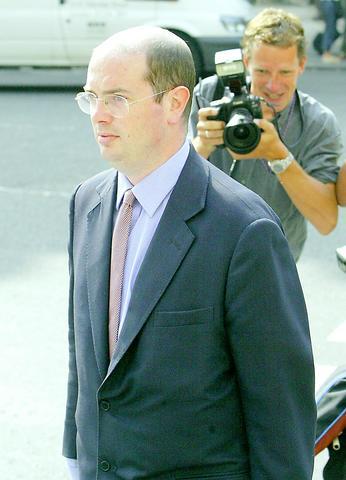Journalist Andrew Gilligan, whose story that the British government had "sexed up" the risk from Iraqi weapons was criticized in an inquiry as unfounded, has resigned from the BBC, arguing the report was largely right.
Analysts said Gilligan's resignation might put an end to a feud between the government and the BBC, where two top figures have resigned since the inquiry led by Lord Hutton took the public broadcaster to task.

PHOTO: AFP
But some British newspapers yesterday renewed calls for a full inquiry into the intelligence Prime Minister Tony Blair's government drew on to persuade parliament and the public to follow the US to war.
Gilligan maintained in his resignation statement on Friday that his report that the government knowingly exaggerated the threat posed by Iraq to justify the war was mostly right.
"If Lord Hutton had fairly considered the evidence he heard, he would have concluded that most of my story was right. The government did sex up the dossier, transforming possibilities and probabilities into certainties, removing vital caveats," he said.
Hutton's inquiry examined the events leading up to the death of British Iraq weapons expert David Kelly who killed himself in July after being unmasked as the source of Gilligan's report.
In an editorial, the Times newspaper said yesterday there was no "credible reason" for resisting calls to hold a full inquiry into the intelligence the government published on Iraq.
"Tony Blair should realize that the longer he holds out against it, the more damage he will do to the war on terror he has bravely championed," it said.
David Kay, former head of the US hunt for Iraq's banned weapons, said last week he did not believe biological and chemical weapons stockpiles existed, and Condoleezza Rice, US President George W. Bush's national security adviser, has acknowledged there may have been flaws in the intelligence.
Bush himself said on Friday he was seeking clarity over the intelligence reports.
Blair's foes, many commentators and large parts of the public were bewildered at the wholesale bill of health Hutton handed the government compared with his censure of the BBC.
Anti-war campaigners from the Stop the War coalition were due to protest at Blair's Downing Street offices later yesterday over what they describe as Hutton's "whitewash."
Lord Hutton lambasted BBC management procedures as "defective," leading to the resignations of BBC Director General Greg Dyke on Thursday and chairman of the board of governors Gavyn Davies on Wednesday.
The BBC apologized unreservedly on Thursday and British Prime Minister Tony Blair declared an end to the feud.
Professor Stephen Barnet, of the University of Westminster, said: "It would be nice to think that with this final, third resignation that we really could draw a line under the whole thing."
The BBC's acting director general Mark Byford would not comment directly on whether there would be more BBC resignations, telling BBC television late on Friday:
"The BBC this week has faced the resignation of the chairman, the resignation of the director general, the resignation of that reporter.
"Now there is a still process going on involving others. It'll be done as speedily as possible and that's all I can say."

AGING: As of last month, people aged 65 or older accounted for 20.06 percent of the total population and the number of couples who got married fell by 18,685 from 2024 Taiwan has surpassed South Korea as the country least willing to have children, with an annual crude birthrate of 4.62 per 1,000 people, Ministry of the Interior data showed yesterday. The nation was previously ranked the second-lowest country in terms of total fertility rate, or the average number of children a woman has in her lifetime. However, South Korea’s fertility rate began to recover from 2023, with total fertility rate rising from 0.72 and estimated to reach 0.82 to 0.85 by last year, and the crude birthrate projected at 6.7 per 1,000 people. Japan’s crude birthrate was projected to fall below six,

Conflict with Taiwan could leave China with “massive economic disruption, catastrophic military losses, significant social unrest, and devastating sanctions,” a US think tank said in a report released on Monday. The German Marshall Fund released a report titled If China Attacks Taiwan: The Consequences for China of “Minor Conflict” and “Major War” Scenarios. The report details the “massive” economic, military, social and international costs to China in the event of a minor conflict or major war with Taiwan, estimating that the Chinese People’s Liberation Army (PLA) could sustain losses of more than half of its active-duty ground forces, including 100,000 troops. Understanding Chinese

US President Donald Trump in an interview with the New York Times published on Thursday said that “it’s up to” Chinese President Xi Jinping (習近平) what China does on Taiwan, but that he would be “very unhappy” with a change in the “status quo.” “He [Xi] considers it to be a part of China, and that’s up to him what he’s going to be doing, but I’ve expressed to him that I would be very unhappy if he did that, and I don’t think he’ll do that. I hope he doesn’t do that,” Trump said. Trump made the comments in the context

SELF-DEFENSE: Tokyo has accelerated its spending goal and its defense minister said the nation needs to discuss whether it should develop nuclear-powered submarines China is ramping up objections to what it sees as Japan’s desire to acquire nuclear weapons, despite Tokyo’s longstanding renunciation of such arms, deepening another fissure in the two neighbors’ increasingly tense ties. In what appears to be a concerted effort, China’s foreign and defense ministries issued statements on Thursday condemning alleged remilitarism efforts by Tokyo. The remarks came as two of the country’s top think tanks jointly issued a 29-page report framing actions by “right-wing forces” in Japan as posing a “serious threat” to world peace. While that report did not define “right-wing forces,” the Chinese Ministry of Foreign Affairs was